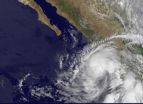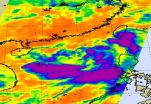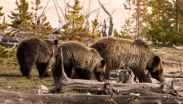U of M researchers find smart decisions for changing environmental times
2011-06-22
(Press-News.org) You've just been told you're going on a trip. The only problem is, you don't know where you're going, how you'll be traveling, or what you'll do when you get there.
Sound like a wild ride? It's the one our planet is on right now. As land use, human population, consumption and atmospheric greenhouse gas concentrations change at an unprecedented pace with complex and unpredictable interactions, it's anybody's guess where we'll end up or what we can do to ensure the most favorable outcome.
Recognizing that "guess" is not good enough when talking about the viability of an entire planet, researchers from the University of Minnesota's College of Food, Agricultural and Natural Resource Sciences and Institute on the Environment teamed up with others at the University of Wisconsin and the Stockholm Resilience Center to find a better way. Together, experts evaluated existing environmental decision-making tools and constructed an approach they think will give us the best chance at making good choices for an uncertain future. They reported their work in the most recent issue of Trends in Ecology and Evolution.
"We're trying to do a good job of leaving behind a habitable planet," said Stephen Polasky, a University of Minnesota applied economist, Institute on the Environment resident fellow and lead author on the paper. "It's easier to be a good planetary steward when you know where you're going. But we're driving with a muddy windshield. We could make mistakes and end up where we don't want to be."
The researchers looked at four "tools to clear the windshield" -- strategies for making decisions in the face of uncertainty: decision theory, threshold approaches, scenario planning and resilience thinking. Evaluating the strengths and limitations of each, they recommended bringing the best aspects of all together to create a two-phase process that boosts the ability to gather new information and perspectives; make decisions without full knowledge, but using best knowledge; and learn from decisions and then incorporate the lessons learned into future decisions.
"There's been a lot of review of these different approaches and their utility, but not an integrative framework," said co-author Bonnie Keeler, an IonE interdisciplinary graduate fellow. "We can't just use tools from economics; we can't just use scenarios; we can't just use thresholds. We need to think of all of these in combination."
In the first phase of the innovative strategy, decision-makers create a list of possible scenarios that include responses that allow plenty of room for rolling with the punches if something unexpected happens. The second phase involves choosing among courses of action based on those scenarios and available knowledge. After the decision is made and the consequences emerge, the process then starts again with the insights gained from experience factored in.
"The take-home message is that there are some very powerful tools out there, like decision theory, but they typically require that you know a lot [about the likelihood of various possible outcomes]," Polasky said. "We're trying to think about a broader array of things that possibly could happen and anticipate what we might do about them."
Polasky said he hopes the new approach will help decision-makers recognize the value of looking at a wide range of possible scenarios when selecting the path most likely to lead to a desirable outcome. So, for example, when making insurance decisions, companies or individuals would consider not only the events that have happened in the past, but also unprecedented events that could occur in the future.
"We may think we know the probability of a storm hitting my house," he said. "What if the climate is changing so we don't know the future probability of a storm? [We need to] be clever and creative and take a wide view so we're not surprised by things."
INFORMATION: END
ELSE PRESS RELEASES FROM THIS DATE:
2011-06-22
INDIANA DUNES NATIONAL LAKESHORE, Ind. —Native bees – often small, stingless, solitary and unnoticed in the flashier world of stinging honeybees – are quite discriminating about where they live, according to U.S. Geological Survey research.
The study found that, overall, composition of a plant community is a weak predictor of the composition of a bee community, which may seem counterintuitive at first, said USGS scientist and study lead Ralph Grundel. This may be because specialized plant-bee interactions, in which a given bee species only pollinates one plant species ...
2011-06-22
BLACKVILLE, S.C. — Scientists from Clemson University and the USDA Agricultural Research Service have developed a new variety of not-so-sweet potato, called Liberty.
Known as a boniato, or tropical sweet potato, Liberty has a dark red skin and light yellow, dry flesh with a bland flavor. Boniato potatoes originated in the tropical Americas and are grown in south Florida in the United States. They can be served fried, mashed or in soup.
"We developed Liberty because other boniato varieties are susceptible to damage by nematodes (microscopic parasitic worms)," said John ...
2011-06-22
An international team of scientists led by researchers at the University of California, San Diego School of Medicine have used induced pluripotent stem cells (iPSCs) derived from patients with amyotrophic lateral sclerosis (ALS) to reveal for the first time how reduced levels of a specific protein may play a central role in causing at least one inherited form of the disease.
The work, published in the June 2011 online issue of the journal Human Molecular Genetics, could help scientists overcome a major hurdle in the study and treatment of ALS, an incurable neuromuscular ...
2011-06-22
AMARILLO – One potato field west of Bushland hosts three separate studies, all aimed at helping growers nationwide, even internationally, understand the habits and controls of the potato psyllid.
The potato psyllid is the insect that transmits a bacterium that causes the relatively new disease in potatoes known as zebra chip, according to Dr. Charlie Rush, Texas AgriLife Research plant pathologist.
The team of AgriLife Research scientists and a Texas AgriLife Extension Service specialist is working on potato psyllid control and epidemiology of disease transmission under ...
2011-06-22
Hurricane Beatriz is skirting the southwestern Mexican coast today, June 21 and bringing heavy rains and high surf to coastal areas, including Mexico's biggest port. NASA satellite imagery showed that Beatriz seemed to develop an eye that opened on microwave imagery and closed on visible imagery, appearing to give satellites a "wink."
Last night (June 20, 2011) by 8 p.m. EDT, heavy rains were spreading over the southwestern Mexican coast. At that time, Beatriz was still a tropical storm. By 11 p.m. EDT Beatriz had strengthened into a hurricane. At 5 a.m. EDT today, June ...
2011-06-22
Tropical Depression 06W is still slowing, making its way through the South China Sea today and has weakened overnight. NASA infrared satellite imagery showed a much more disorganized storm with scattered convection, which accounts for its weakened status from tropical storm to tropical depression.
On June 21 at 1500 UTC (11 a.m. EDT) the newly weakened Tropical Depression 06W was located about 480 nautical miles east-southeast of Hanoi, Vietnam near 18.8 North and 113.8 East. Depression 06W's maximum sustained winds had decreased to 25 knots (28 mph/46 kmh). It was moving ...
2011-06-22
Leading online casino CastleCasino.com has today furthered their live dealer offering with a new Spanish speaking version of their renowned live roulette game, broadcasted by real croupiers totally in Spanish.
The new Spanish version of the live roulette game is shown live during 19.30PM and 4.00AM GMT and will feature in addition to the current English speaking version of the game. As well as the croupiers interacting with players in the Spanish language, the new live roulette version game interface will also be designed in Spanish, making it the easier for Spanish ...
2011-06-22
The independent assessment, written by WCS Senior Conservation Scientist Dr. John Weaver, is a compilation and synthesis of the latest information on these species – and how climate change may affect them – from 30 biologists in the region and from nearly 300 scientific papers. In addition, Weaver spent four months hiking and riding horseback through these remote roadless areas to evaluate their importance for conservation.
The Crown of the Continent is a trans-border ecosystem of dramatic landscapes, pristine water sources, and diverse wildlife that stretches more than ...
2011-06-22
Chef Don at The Eatery on Beach Street has a delicious new creation for the dog days of summer: The "Anthony" Weiner.
It's a kosher, half-pound hotdog served wrapped in lettuce or on a toasted bun. Patrons can choose toppings from ketchup, mustard, relish, grilled onions, chili, and even a bbq sauce with a hint of chocolate if they find the plain Anthony hard to swallow.
The Anthony comes with hand cut fries on the side. "We recommend the Anthony wiener stay wrapped at all times," quipped Chef Don Gifford.
Good and wholesome, this Anthony ...
2011-06-22
CHAMPAIGN, lll. — With the BeeSpace Navigator, University of Illinois researchers have created both a curation tool for genetic biologists and a new approach to searching for information.
The project was a collaboration between researchers at the Institute for Genomic Biology and the department of computer science. Led by Bruce Schatz, professor and head of medical information science at the U. of I., the team described the software and its applications in the web server issue of the journal Nucleic Acids Research.
When biologists need information about a gene or its ...
LAST 30 PRESS RELEASES:
[Press-News.org] U of M researchers find smart decisions for changing environmental times





